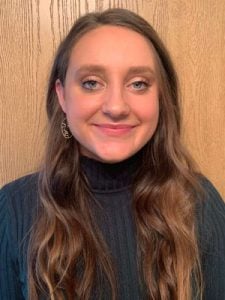Ember McCoy

Graduate Student
@embermc
What is your area of research or expertise that you bring to the Landscapes collaboration?
My dissertation is on the politics of expertise informing U.S. air pollution policymaking and its impact on environmental justice communities. To the landscapes lab, I bring a strong skill set in spatial analysis work through the lens of investigating how systemic racism impacts the spatial distribution of environmental health hazards and health inequities in nuanced ways.
What do you find challenging or exciting about interdisciplinary collaboration?
I love how our interdisciplinary collaborations allow us to come together as a group of researchers who study the same issues from different expertise angles. While I bring policy and geography knowledge to our group, I learn so much from people studying the technical, health dimensions of air pollution and I really appreciate how we can learn and grow from each other. I think the big challenges of this collaborative work are SCHEDULING (haha) and decoding disciplinary language — there’s so many different terms that feel common in certain fields that aren’t in others, so strong communication and humility — feeling comfortable to pause and ask when you don’t understand something — are both essential qualities of a successful collaboration!
What’s one common misconception about your area of research that you’d like to dispel?
I think a lot of people see critical geography and social studies of science as more theoretical or “ivory tower” facing research. But I’m really passionate about emphasizing the need for scholars and the public to understand the socio-political dimensions of scientific or technical research and demonstrating its policy and community value.
How did you become interested in structural racism and health?
My understanding of structural racism and health first came through hearing about my mom’s experience growing up right outside of a “environmental justice” community in Chicago — predominately Black, low-income, and a product of White flight. But at the time, I’m not sure I could really articulate what was happening in those terms, or in the ways I see it now. While I was interested in environmental studies broadly early on, it was through college social work classes, work experience in Portland where I saw first-hand issues stemming from environmental non-profits understanding (or lack of understanding) of environmental racism and equity issues, and my involvement in community-based research in Southwest Detroit during my masters degree that I became familiar with structural racism and health as an area of study and became more and more passionate about dedicating my life’s work to this area at its intersection with the environment.
What’s the academic path that brought you to where you are now?
I fell in love with environmental studies in a high school AP Environmental Science class my senior year (s/o to Mr. Armstrong!) and immediately changed my major when I entered college to environmental science from my intended English / secondary education path. I went to a small liberal arts college (Carthage College in Kenosha, WI) that I honestly mostly chose based on athletics, but my experience in a liberal arts degree program and being forced to take classes across disciplines (ecology, political science, sociology, geography, more!) really shaped my research direction and interdisciplinary emphasis today. My current research questions and interests themselves are truly a product of my experience working closely with residents in Southwest Detroit, and I owe my PhD and academic path to the incredible group of activists that I work with there.
If you had the opportunity to get one question answered by an omniscient being, what would you ask? (this is meant to be a lighthearted question–we’re trying to get to the heart of what you are most curious about, whether within your field of research or beyond! Feel free to think big!)
How can we convince people that climate change, systemic racism, and injustices across different issues (health, policing, environment) are real and matter? I so often feel frustrated, stuck, or that I’m yelling either into an echo chamber or brick wall and nothing in between. Omniscient being — tell us what to do!!
Anything else you want to share?
I’m really grateful for the Graduate Employees Organization (3550) – our graduate student labor union at UM so I want to give them a shout out here! If you’re a graduate student reading this, check out GEO and become a union member: https://www.geo3550.
